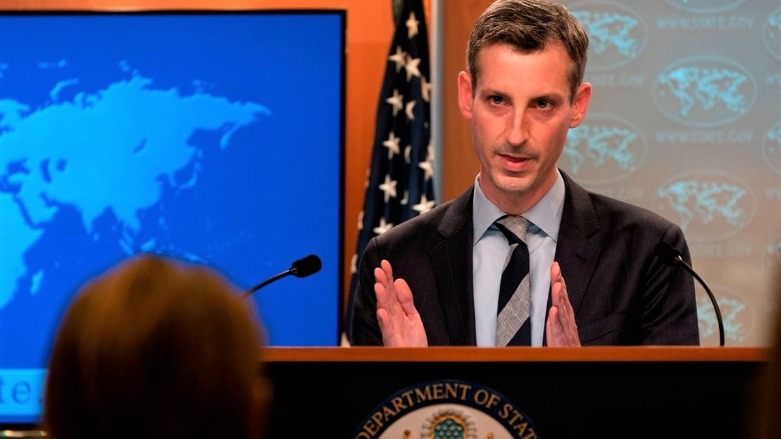US criticizes ‘burgeoning relationship’ between Iran and Russia

WASHINGTON DC, United States (Kurdistan 24) –Addressing reporters on Wednesday, State Department Spokesperson Ned Price deplored the movement toward a less liberal world order represented by the actions of countries like Russia and China. In that context, Price criticized the increasingly close relationship between Tehran and Moscow that has emerged following Russia’s war in Ukraine.
“We have seen a burgeoning relationship, including in the security realm between the PRC [People’s Republic of China] and Russia,” Price began.
“We’ve seen a burgeoning relationship between Russia and Iran,” he continued,” and we have made public elements of it.”
Indeed, last month, on July 11, National Security Advisor Jake Sullivan revealed that Iran was preparing to send “up to several hundred” weapons-capable drones to Russia for use in Ukraine, as he denounced the move “as a profound threat.”
Read More: US reiterates: Iran is selling armed drones to Russia
A month later, on August 11, State Department Principal Deputy Spokesperson, Vedant Patel, provided an update on that situation.
“During the last several weeks,” he said, “Russian officials conducted training in Iran as part of the agreement on the UAV [Unmanned Aerial Vehicle—i.e. drone] transfers.”
Patel also denounced Iran’s “use and proliferation of UAVs,” explaining,“they have been used to attack U.S. forces, our partners in the region, and international shipping entities.”
Such Iranian actions against the Kurdistan Region, whether directly or through proxies in Iraq, were an important element in a bipartisan letter which the top Democrat on the Senate Foreign Relations Committee, Sen. Robert Menendez, and the top Republican, Sen. James Risch, sent Secretary of State Antony Blinken on Monday, in which they called for more vigorous US support for Erbil in its disputes with Baghdad.
A month ago, on July 19, Russian President Vladimir Putin travelled to Tehran, where he met Iran’s Supreme Leader, Ayatollah Ali Khamenei, as well as the Iranian and Turkish presidents in a trilateral summit. “Putin Finds a New Ally in Iran, a Fellow Outcast,” was The New York Times report on that diplomacy.
Putin’s visit to Iran was his first trip since Russia’s assault on Ukraine began on February 24, to a country outside of the territory of the former Soviet Union. And he was well-rewarded by Iran’s Supreme Leader, who provided what The New York Times characterized as “a full-throated endorsement for Russia’s invasion of Ukraine.”
“Russia and Iran Double Down on Their Strategic Partnership” is the title of an August 11 report, written jointly by the Institute for the Study of War and the American Enterprise Institute.
“Russia and Iran have expanded their strategic partnership since Russia invaded Ukraine,” the report begins, as it notes that “senior Russian and Iranian officials have met frequently in recent months to boost cooperation and sign economic and military agreements.” It, thus, concludes, “Iran enjoys a stronger position than it had previously in this partnership,” because of the war in Ukraine.
In addition, in August 2021, the hardliner, Ebrahim Raisi, replaced the relatively moderate Hassan Rouhani as Iran’s president, and that has also contributed to the rapprochement between Moscow and Tehran.
US, EU Undeterred—Continue Pursuit of JCPOA
On Wednesday, Price reaffirmed the position he had articulated the day before. The US had received Iran’s response to the European Union’s “final” text for reviving the 2015 nuclear deal, formally known as the Joint Comprehensive Plan of Action(JCPOA), and it was still studying it. Basically, nothing had changed.
Read More: US continues negotiations with Iran over nuclear deal, despite mounting criticism
The attempt to revive the JCPOA began in April 2021, soon after Joe Biden became president. At the time, Iran and Russia were not as close as they are now, nor were relations between Russia, on the one hand, and Europe and the US, on the other, as hostile as they are now.
Putin’s brutal and unprovoked assault on Ukraine marks the crucial turning point. The EU, along with the US, have taken a very strong stance against Moscow for its attack on Ukraine. Yet the JCPOA talks drag on, as if nothing has changed, and as if Iran should not now be seen as a Russian ally.
Behnam Ben Taleblu, a senior fellow at the Foundation for the Defense of Democracies, disagrees. “Seriously countering the Iran-Russia relationship must begin with stepping back from the JCPOA,” he told Kurdistan 24.
He noted that other countries, including the illiberal powers criticized by Price, are watching Washington’s “dogged approach” toward reviving the JCPOA and concluding that weakness lies behind it.
Finally, as Ben Taleblu noted, the US has no “Plan-B.” It appears unprepared to set a deadline by which Iran must agree to the accord, after which Washington will pursue another course. Consequently, “Iran remains in no rush to ink a deal.” And, hence, “its conditional response to what is supposed to be a final offer.”
